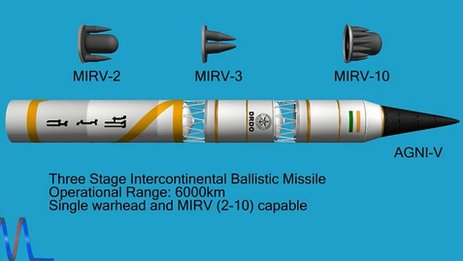The Stockholm International Peace Research Institute (SIPRI) recently released its annual survey of nuclear weapons. The United States with seven thousand three hundred warheads and Russia with eight thousand warheads have been dismantling their huge arsenals left over from the Cold War. The other signatories of the international nuclear arms treaties are China with two hundred and fifty warheads, France with three hundred warheads and the United Kingdom with two hundred and twenty five warheads. There are four other nuclear armed nations that have not signed the nuclear non-proliferation treaties. Israel has about eighty warhead, Pakistan has one between one hundred and one hundred and twenty warheads and India has ninety to one hundred and ten warheads. North Korea is thought to have a few small nuclear warheads but lacks sophisticated and powerful delivery systems. All in all, there are about sixteen thousand nuclear warheads in the world with four thousand that are operational and ready to launch.
The survey points out that although signatories of the nuclear non-proliferation treaties have been paying lip services to eventually getting rid of all nuclear weapons, they have all announced intentions to deploy new delivery systems and upgrade their warheads. It is obvious that these nations consider nuclear weapons to be an important part of their strategic arsenal and intend to deploy and maintain them.
The United States is planning on spending over three hundred and fifty billion in the next decade on its nuclear arsenal including a replacement for the current fleet of Trident submarines. Russia is constructing a new class of nuclear missile submarines and replacing the Soviet intercontinental ballistic missiles with mobile versions of the SS-27 missile. China is increasing spending on its ballistic missile program and constructing more warheads.
India is more concerned with its current delivery systems. India does not have any submarines armed with nuclear missiles. It also lacks intercontinental ballistic missiles. India has declared a no-first use nuclear policy. If India is threatened with a nuclear attack from China or Pakistan, it feels that it must have nuclear missile submarines and ICBMs in order to deter attack or retaliate effectively. India has developed and tested an ICBM but it will be years before it can be deployed. They are also working on their first nuclear powered submarine which will be able to carry and launch nuclear missiles.
Pakistan is working on increasing its production of fissile materials so it can construct more warheads. They also have no submarines with nuclear missiles or intercontinental ballistic missiles but, since they do not have to contend with a threat from China, they do not feel the pressure to develop them that India feels.
As I have pointed out before, there are estimates that the detonation of as few as one hundred nuclear warheads could cause a nuclear winter. It is absolutely critical that nuclear armed nations understand that any significant launch of nuclear warheads for any reason from any country could be the end of human civilization. A weapon that destroys the user is useless for defense or retaliation.
India's first ICBM - the Agni V:
